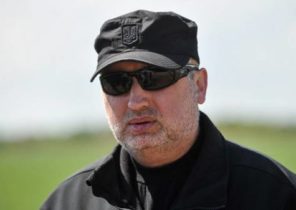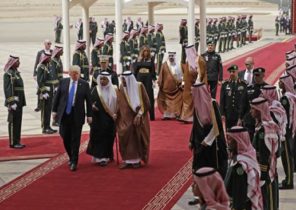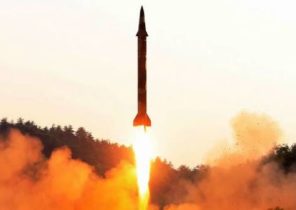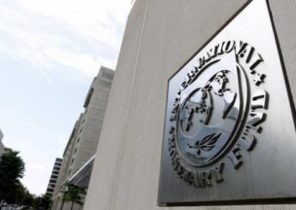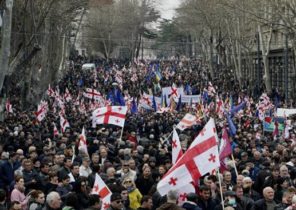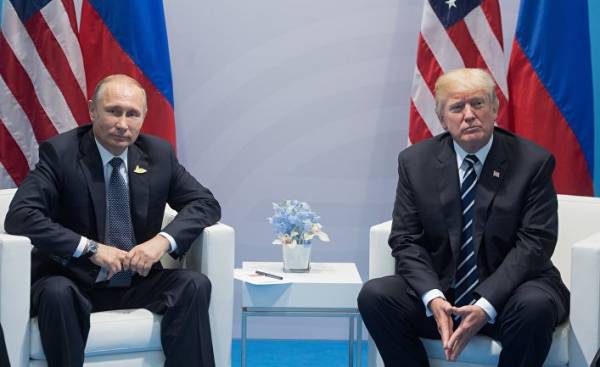
Since then, as it became known about the attempts of Russia to interfere in the American presidential election a little over a year. During this time, the diplomatic fallout from the scandal is the deterioration of relations between Moscow and Washington during the decades of unprecedented scale — managed to gather his harvest.
President Vladimir Putin hoped that Donald trump, for years, speaks warmly about Russia and its authoritarian leader, will refer to his country as you want, Mr. Putin. This implies the attitude of the superpower that Russia once was, or at least as a force to be reckoned with all the way from Syria to Europe, as well as respect for her restored after two decades of decline of the military power.
However, this hope eventually clearly turned against Mr. Putin. If sanctions last week adopted by the Congress by an overwhelming majority voice, sent Moscow a signal that it was a signal that in the coming years of hands Mr. trump, probably related to the issues of cooperation with Moscow.
Just a few weeks ago the two leaders would talk for long hours in Hamburg, and the conversation apparently took place in a friendly tone. Now, however, the prospect of the transactions on which Mr. trump has recently hinted in his interview, it looks as remote as ever. Congress is not ready nor forgive the annexation of Crimea or allow broad investments in the Russian energy sector. The new sanctions were approved by the coalition of Democrats who believe that Mr. Putin has contributed to the defeat of Hillary Clinton, and Republicans, who fear that the President misunderstands what he is dealing with in Moscow.
Its decision to make hundreds of American diplomats and Russians working at the American Embassy, to terminate Mr. Putin, who is known as a great tactician but a mediocre strategist, the newly changed Russian foreign policy. According to American officials and analysts, he is now, apparently, believes that the escalation of the confrontation in cold war-style more beneficial than sophisticated attempts to manipulate events through fraud, cyber-attacks and methods of information warfare.
However, it is unclear how this measure will impact on everyday interaction. Although the Russian press claims that they are forbidden to work 755 diplomats — presumably they should also be expelled American diplomats in Russia, apparently, much less 755.
Most likely, this figure includes Russian citizens working at the Embassy — usually in positions that are not associated with secrecy. According to the report of the inspector General of the Department of state from 2013, the most recent document in the public domain, containing specific data at the Embassy in Moscow and three consulates at that time was 934 “local staff” and 1279 employees in total. This means that Americans in the diplomatic institutions should be about 345. Many of them claim that the Russian authorities regularly harassed them. Of course, in addition to the United States government in Russia there are a lot of Americans outside the diplomatic missions. Experts of various American ministries — from the Ministry of energy to Ministry of agriculture, and a large intelligence residency (however, some of the spies working under diplomatic cover).
“One of the main goals of Putin is to make Russia treated as if it still remained the Soviet Union, that is, as a nuclear power, which is necessary to respect and fear,” notes Angela Stent (Angela Stent), head of the Center for Eurasian, Russian and East European studies at Georgetown University. “He thought he could get it from trump,” says Mrs. Stent, who was responsible for George W. Bush for Russian and Eurasian studies in the National intelligence Council.
Now, however, she adds, the Russians look at the chaos in the White house “and see a certain unpredictability that’s unnerving”. According to her, in response, they turn back to old traditions. The expulsion of diplomats is one of them.
Representatives of the administration, remembering the cold war, also returned to the old language. The Director of national intelligence Dan Coates (Dan Coats), said this month at a security conference in aspen, Colorado, that the Russian, without a doubt, “are trying to undermine Western democracy.” His boss never said nothing of the sort.
Senior administration agreed to talk about one of the most painful for the White house diplomatic problems on the condition of anonymity, says that the White house left no hope to improve relations. The tone of the interview to Russian TV in which Mr. Putin announced the reduction of the diplomatic staff, was aggressive, said the official. Russia, apparently not confident in the direction in which relations are developing, and leaves open the possibility for its change.
“The Russians would prefer not to take that path, but Putin felt that he had no other choice and that he will have to answer in the style of “an eye for an eye”, — said Rolf Mowatt-Larssen, Rolf (Rolf Mowatt-Larssen), who held several high positions in American intelligence and worked in, including in Russia — a New cold war has been going on for some time. No hope for improved relations in the short term, no more.”
In his opinion, the situation worsened at the end of the presidential rule of Obama, “when in a relationship is the prevailing emotion.” Now, says Mr. Mowatt-Larssen, recently became Director of projects in the field of intelligence and defence Belaruskogo center, Harvard Kennedy School, “in relations with Russia rage gave way to fear.”
Russian foreign Minister Sergei Lavrov, a skilled diplomat, holds cautious tone in communicating with the Secretary of state Rex Tillerson (Rex W. Tillerson). In his public statements, he lays the blame not on Mr. trump and not to investigate the Russian special operations related to the us elections, and the Congress. “Recent events indicate that in certain circles of the United States entrenched Russophobia and the policy of open confrontation with our country”, — said Friday the Russian Ministry of foreign Affairs when he became aware of the adoption by Congress of a new law on sanctions.
48 hours later, Mr. Putin announced a sharp reduction in diplomatic staff. According to him, this measure will take effect from 1 September — which leaves time to trade.
However, to cope with the main problem by this time definitely will not work. Mr. Putin has already decided that its key task is to get rid of American and European sanctions imposed in 2014, after annexation of the Crimea, — in the coming years will not be solved. When new sanctions are established by the law — like those that just passed Congress, and Mr. trump reluctantly agreed to adopt in order to avoid to override the veto, they are usually stored for many years.
Moreover, many in Washington are talking about the fact that last year’s attacks on the electoral system was only the beginning. “They are only interested in their own benefit, said the Senate intelligence Committee, FBI Director James Comey (James B. Comey) before Mr. trump fired him, and they will return.”
A veteran of the cold war and the former Director of national intelligence James Clapper, Jr. (James R. Clapper Jr.) recently said about the same, at the same time raising a number of topics, reminiscent of the 1980s and the nuclear arms race. “We rarely mention they launched a very aggressive program to modernize the strategic nuclear potential,” — he stressed.
And here we are faced with real risks. Outside of Syria, where U.S. and Russian armed forces are sporadically in contact, although keeping mutual suspicion, now there is almost no dialogue between the military, the usual for the cold war. Meanwhile in the Baltic sea region and off the coast of Europe now are both Russian and American forces, which increases the likelihood of accidents and misunderstandings.
Another downturn in relations coincided with the 70th anniversary of the release of the article “Sources of Soviet conduct” (“The Sources of Soviet Conduct”), written by the Creator of the strategy of the cold war, George Kennan (George Kennan). It was published in July 1947 in Foreign Affairs magazine under the pseudonym “X”.
This article has defined the strategy that prevailed in Washington the next four decades. Mr. Kennan formulated it as follows: “the United States Policy toward the Soviet Union must imply a long-term, patient but firm and consistent curb the expansionist tendencies of Russia.”
This is not the approach that Mr. trump thought a year ago. However, perhaps this is the approach that he will have to adhere to.
